What size excavator do I need to use?
- News
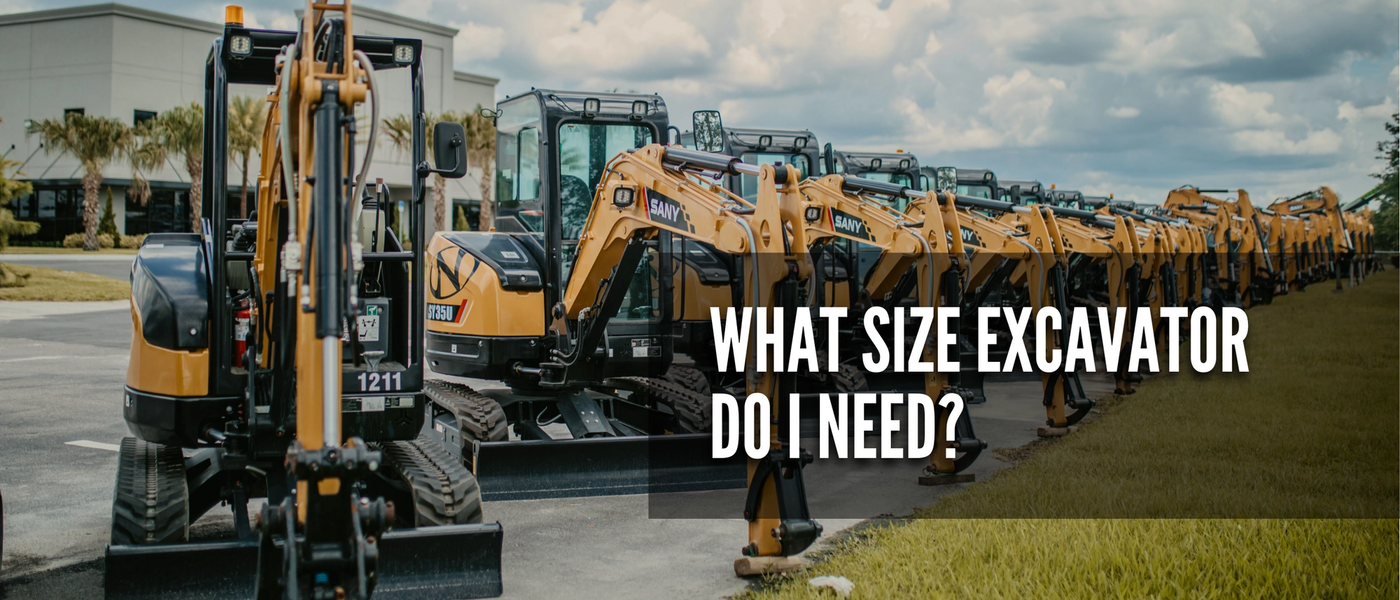
Excavators are a fun piece of equipment. Choosing the size you need is a critical decision that can significantly affect the efficiency and success of your construction or excavation project. This guide is designed to help match the right excavator to your specific needs.
Whether you're digging a foundation, landscaping, or handling heavy materials, we’d love to help make sure you have the exact power and size you need to get the job done efficiently and economically.
Understanding Excavator Sizes
When we talk about the 'size' of an excavator, we're referring to more than just the machine's physical dimensions. Size encompasses several factors defining the machine's class and capabilities, including weight, engine power, and bucket capacity. Excavators are commonly segmented into weight classes — such as mini, midi, standard, and large — each suited for different scales of work.
Mini Excavators
Also known as compact excavators, these machines typically weigh between 1.5 and 7 tons and offer excellent maneuverability for tight spaces and smaller jobs like residential landscaping or minor utility repairs.
Midi Excavators
Bridging the gap between mini and standard excavators, midi excavators weigh between 7 and 10 tons and balance compactness with increased power for medium-scale projects.
Standard Excavators
Falling in the 10- to 45-ton range, these are the workhorses of most construction sites, capable of substantial digging power and loader capacity for all sorts of building and excavation tasks.
Large Excavators
Weighing over 45 tons, large excavators are meant for heavy-duty operations such as mining and large-scale demolition, featuring exceptionally high power and deeper digging capabilities.
Each size category has bucket sizes and attachments that further define their suitable applications. Understanding these classes and their typical uses is the first step in matching an excavator to your project needs.
Assessing Job Requirements
Selecting the right excavator size isn't just about the machine's capabilities; it's also about the specifics of the job. Consider the digging depth required, the height at which materials need to be dumped, and the reach necessary to access the work area. These requirements dictate the size and type of excavator needed for efficiency and effectiveness.
- Depth: An excavator's maximum digging depth determines how deep it can excavate without repositioning. Standard to large excavators are more suitable for foundational work or deep trenching.
- Height: If you're working on a site that requires material to be loaded onto high platforms or dump trucks, the maximum dumping height becomes a critical consideration.
- Reach: The horizontal reach of the excavator's arm is crucial, especially when working in areas where the machine cannot move closer to the material or the trench.
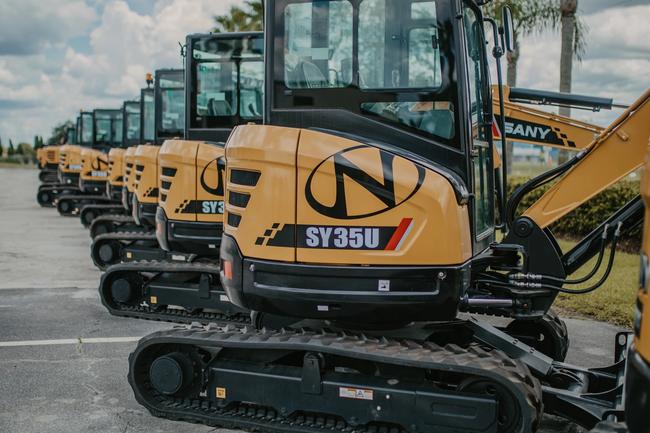
Mini Excavators: Benefits and Limitations
Mini excavators are the nimble warriors in the excavator family, designed for their versatility and ability to work in constrained spaces where larger machines cannot tread (or roll). Here's when and why to opt for a mini excavator:
When to Choose a Mini Excavator
These compact units are ideal for urban construction sites, home landscaping projects, and indoor demolition where space is limited and precision is paramount.
Jobs Suited for Mini Excavators
With their small footprint, mini excavators excel in tasks like:
- Residential landscaping
- Small-scale demolition tasks
- Digging for pools or garden ponds
- Trenching for utility lines
- Grave-digging
Their ease of maneuverability also makes them perfect for tasks within developed areas where disruption needs to be minimal.
Limitations
While mini excavators boast efficiency and accessibility, they have limits. Their size means less power than larger models, making them unsuitable for heavy-duty digging or lifting tasks requiring deeper excavation or handling of heavy materials. They often have reduced dig depth and breakout force, which means a larger machine might be necessary for substantial excavation work.
The hydraulic flow will be better as you size up in machines. So, depending on the type of attachments you need, you might have to scale up the machine.
Ultimately, mini excavators balance functional capability and size-constrained versatility, making them an excellent option for lighter workloads and precision tasks that larger excavators simply couldn't handle with the same finesse.
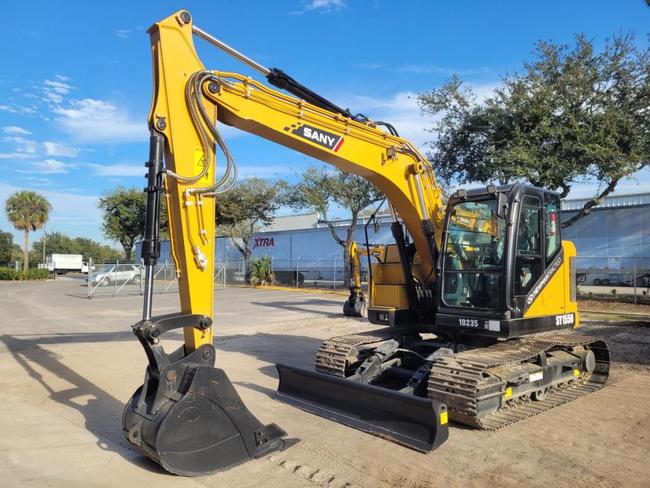
Midi Excavators: The Middle Ground
Midi excavators serve as the versatile middle ground in the excavator lineup, blending the compactness of mini excavators with the power closer to standard models. These machines typically weigh between 7 and 10 tons and can handle a broader range of tasks without the spatial limitations of their larger counterparts.
Versatility of Midi Excavators
Midi excavators are the jack-of-all-trades in the excavator world. They offer increased power and deeper digging capability compared to mini excavators yet maintain a level of agility and compactness that larger excavators can't match. This versatility makes them highly adaptable to various work environments.
Ideal Scenarios
Midi excavators are well-suited for mid-sized projects like:
- Urban redevelopment
- Larger landscaping jobs
- Small to medium construction projects
- Utility installations
They are the go-to option when a mini excavator's reach and power fall short, but a standard excavator's size would be excessive.
Comparison with Mini and Standard Excavators
Midi excavators offer a balanced compromise between mini and standard excavators. While they lack the confined space accessibility of mini excavators, they provide greater digging depth and power. Compared to standard excavators, they offer better maneuverability and are easier to transport, making them a practical choice for projects that don’t require the heavy-duty capabilities of larger machines.
Midi excavators are the ideal solution when your project demands more power and reach than a mini excavator can provide, but where the size and power of a standard excavator aren't necessary. They fill the gap perfectly, offering a balanced solution for many applications.
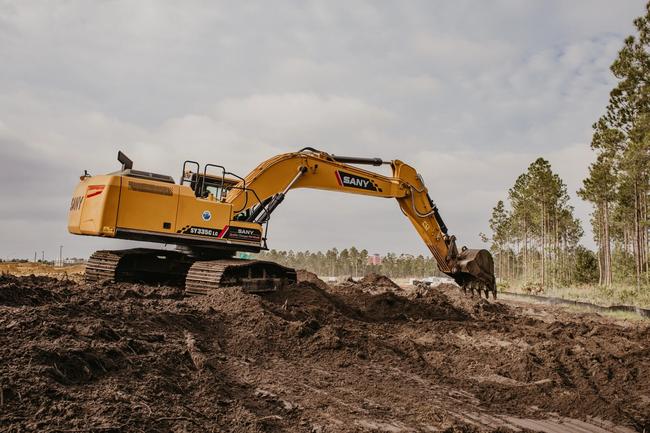
Standard Excavators: The Industry Staple
Standard excavators, typically weighing 10 to 45 tons, are the familiar giants on construction sites. Their size and capabilities make them the default choice for a broad spectrum of construction projects.
Common Sizes for General Construction
These excavators are the workhorses of the construction world, suited for a wide range of residential and commercial construction tasks. Their size and power enable them to handle tasks that are too demanding for mini or midi excavators.
Ideal Jobs for Standard Excavators
These machines excel in projects like:
- Large-scale residential construction
- Extensive utility work
- Road construction
- Significant landscaping projects.
Their robust build allows them to perform heavy digging, trenching, lifting of large objects, and extensive earthmoving with ease.
Variety and Versatility
Within the standard excavator category, there is considerable variety in terms of power, bucket size, and attachment compatibility. This versatility allows these excavators to be customized with different attachments for tasks like demolition, material handling, or even more precise digging and grading. The ability to adapt to various attachments makes standard excavators incredibly versatile and capable of excavation and many other tasks on a construction site.
For many reasons, standard excavators are the backbone of the construction industry, offering the perfect blend of power, reach, and versatility for most construction projects. Their adaptability and a range of attachments ensure they're not just a jack of all trades but a master of many in construction.
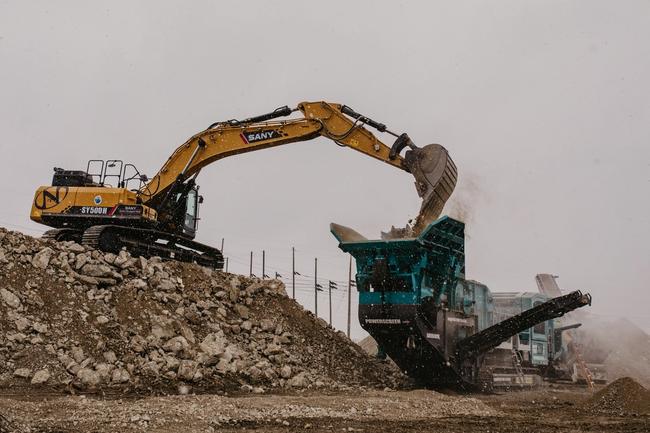
Large Excavators: For Heavy-Duty Work
Large excavators come into play when the project scope escalates to include tasks like extensive mining or large-scale demolition. These behemoths, weighing over 45 tons, are engineered for the most demanding tasks, where size and power are non-negotiable.
When to Opt for Large Excavators
You'd typically need a large excavator when dealing with projects that involve moving vast amounts of earth quickly, heavy lifting of large or dense materials, or breaking through tough surfaces. Their size and strength make them indispensable for major construction, mining operations, and large-scale demolition projects.
Ideal Projects for Large Excavators
Large excavators are the go-to machines for:
- Large-scale construction projects
- Mining
- Extensive demolition work
- Large infrastructure projects like:
- Highway construction
- Major landscaping
- Large waterway or
- Port development projects.
Their deep digging capabilities, significant lifting capacities, and overall robust construction allow them to handle tasks that are beyond the reach of smaller excavators.
When the project scale is massive and the workload intense, large excavators are the reliable giants that professionals turn to. They are built to handle the heaviest tasks.
Additional Considerations
Selecting the right excavator is not just about size; other crucial factors to consider can significantly impact the machine's suitability and efficiency for your specific project.
Impact of Attachments
The type of attachments used with an excavator can greatly extend its capabilities and may influence the excavator size you need.
Transport and Logistics
The size of the excavator also affects transportation logistics. Larger excavators require specialized transport equipment and may involve additional costs and planning for movement between sites. And some minis don’t even need to be hauled by anything requiring a CDL. Considering how the excavator will be transported is crucial, especially for projects across different locations.
Environmental Impact and Fuel Efficiency
The excavator's environmental footprint and fuel efficiency are important considerations. Larger excavators generally consume more fuel and may have a greater environmental impact. Opting for the most efficient machine to perform the job effectively can reduce operating costs and environmental footprint.
Cost Considerations
When deciding on the right size excavator for your project, finances come into play. Sorry, they can’t be avoided. This includes the initial cost of renting or buying the excavator and the ongoing operational costs associated with its size.
Renting vs. Buying Based on Size
The decision to rent or buy an excavator often hinges on its size and frequency of use. Larger excavators come with a higher price tag, making renting a cost-effective option for short-term or infrequent projects. Conversely, for regular use over long periods, investing in purchasing an excavator, especially smaller or midi-sized models, could be more economical in the long run. Buying also means you have to account for those sizing decision factors based on various jobs, not just the current job, and often will sway your decision thinking in the long term vs. what you need right away.
Impact on Operational Costs
The size of the excavator directly impacts its operational costs. Larger excavators typically incur higher fuel consumption, maintenance, and transportation costs. For instance, transporting a large excavator from one site to another can be a significant logistical undertaking, requiring special permits and transport equipment, thus adding to the overall project cost. On the other hand, smaller excavators, while limited in capabilities, are more fuel-efficient and easier to transport, leading to lower operational costs.
Consult the Experts
When selecting the right excavator for your project, tapping into the expertise of seasoned professionals can make a significant difference. Consulting with dealers or rental companies like Newman Tractor provides invaluable insights that can fine-tune your decision-making process.
Leveraging Dealer Expertise
Dealers and rental companies have extensive knowledge about the capabilities and best use cases for different sizes of excavators. They can provide detailed advice based on your specific project requirements, considering factors like the project’s scale, duration, and environmental conditions. Their expertise helps identify the most suitable excavator model that fits the job and aligns with your budget and operational preferences.
Tailored Recommendations for Your Project
Every project is unique, and the one-size-fits-all approach doesn’t work when choosing excavation equipment. Experts at companies like Newman Tractor understand this. They can offer personalized recommendations, ensuring that the excavator you select best matches your project’s specific needs. This consultation can help you avoid over-investing in a machine too large for your requirements or underestimating the need for a more powerful excavator.
Choosing the right excavator size is a decision that will greatly impact the success of your project and business. Throughout this guide, we've explored the various sizes of excavators—from the compact mini to the formidable large excavators—and their roles in different project scenarios. We've emphasized the importance of matching the excavator to the specific job requirements, including depth, reach, operational costs, and safety considerations. The versatility offered by different attachments, logistical aspects of transport, and environmental impacts were also highlighted as key considerations.
Remember, the decision doesn't just hinge on the technical specifications of the excavator. It's about understanding the unique needs of your project, considering the financial implications, and ensuring the safety of all involved. Consulting with experienced professionals, like those at Newman Tractor, can give you the tailored advice you need to make the best choice.
Whether you're embarking on a small residential project or a large-scale construction job, taking the time to consider all these factors will help ensure you select the right excavator for the job. Expert advice is invaluable in this process, helping you to navigate the options and make a choice that leads to efficient, safe, and cost-effective project completion.
